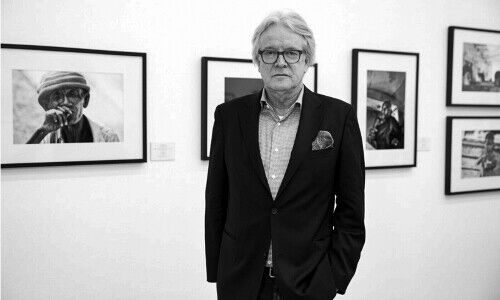The economy is in crisis mode. Business leaders are going to have to do everything in their power to turn things around. In a piece for finews.first, Brigitte Kaps discusses how they can effectively − and decisively − communicate during a downturn.
This article has been published on finews.first, a forum for authors specializing in economic and financial topics.
According to the most recent estimates by the International Monetary Fund (IMF), global economic growth is going to fall to 2.8 percent this year, down from 3.4 percent in 2023. From 2024 on, the expectation is that it will hover around 3 percent. Switzerland, for its part, will likely eke out very marginal gains in that time.
That means that CEOs currently face the challenge of ensuring that their business remains on track. They also need to provide a picture of future prospects to employees and investors and communicate them effectively.
Successful communication in difficult economic situations requires a balance of honesty, optimism, and – most importantly – empathy! The tips below can help:
1. Explain the Context
Your audience has to understand the broader economic context influencing your company. You should provide simple and easily understood explanations of external factors that influence your business, including market trends, and sectoral or regulatory changes.
2. Be Honest and Transparent
Honesty and transparency are decisive in communication, particularly in difficult economic times. Acknowledge the current conditions and their impact on your company. Avoid playing down or portraying the situation as rosier than it actually is, as that can undermine the trust stakeholders have in you.
3. Show Empathy
Show an understanding of the personal impact that an economic downturn can have on your employees and investors. Show compassion and understanding in your communication while reassuring them that you are doing everything to ensure their well-being and the company's success. Be open to feedback and respond to questions or doubts with empathy and professionalism.
4. Concentrate on Solutions
Recognize the challenges while pointing to the steps your company is making to manage them. Share the initiatives, strategies and measures that you intend to implement to mitigate the impact of recessionary developments. With that, it is also important to highlight your company's resilience and adaptability in a tough business environment.
5. Communicate Opportunities
Your company may see opportunities that you can take advantage of in a shrinking economy. Communicate all the potential opportunities such as new trends you are following, or innovative solutions that you have in play. These need to be backed up by facts and numbers. It is a good way to show that your company is proactively looking for new ways to grow.
6. Remain Positive But Realistic
Even though it is important to keep the tone of your communication positive, you also have to be mindful of being realistic about the challenges your company faces. Avoid empty promises or unreachable forecasts. Concentrate on achievable targets.
7. Communicate Regularly
It is particularly important to inform stakeholders regularly about how you are progressing in a difficult economic environment. That can include updates, financial reports, question-and-answer sessions, and any other relevant information.
Brigitte Kaps is the CEO and founder of Rent a PR. She holds a Master of Advanced Studies in Business Communications (HWZ, MAZ & LSE) and has studied communications at the Frankfurt University of Applied Sciences. She also has 20 years of international experience working in bank sector management roles.
Previous contributions: Rudi Bogni, Peter Kurer, Rolf Banz, Dieter Ruloff, Werner Vogt, Walter Wittmann, Alfred Mettler, Robert Holzach, Craig Murray, David Zollinger, Arthur Bolliger, Beat Kappeler, Chris Rowe, Stefan Gerlach, Marc Lussy, Nuno Fernandes, Richard Egger, Maurice Pedergnana, Marco Bargel, Steve Hanke, Urs Schoettli, Ursula Finsterwald, Stefan Kreuzkamp, Oliver Bussmann, Michael Benz, Albert Steck, Martin Dahinden, Thomas Fedier, Alfred Mettler, Brigitte Strebel, Mirjam Staub-Bisang, Nicolas Roth, Thorsten Polleit, Kim Iskyan, Stephen Dover, Denise Kenyon-Rouvinez, Christian Dreyer, Kinan Khadam-Al-Jame, Robert Hemmi, Anton Affentranger, Yves Mirabaud, Katharina Bart, Frédéric Papp, Hans-Martin Kraus, Gerard Guerdat, Mario Bassi, Stephen Thariyan, Dan Steinbock, Rino Borini, Bert Flossbach, Michael Hasenstab, Guido Schilling, Werner E. Rutsch, Dorte Bech Vizard, Adriano B. Lucatelli, Katharina Bart, Maya Bhandari, Jean Tirole, Hans Jakob Roth, Marco Martinelli, Thomas Sutter, Tom King, Werner Peyer, Thomas Kupfer, Peter Kurer, Arturo Bris, Frederic Papp, James Syme, Dennis Larsen, Bernd Kramer, Armin Jans, Nicolas Roth, Hans Ulrich Jost, Patrick Hunger, Fabrizio Quirighetti, Claire Shaw, Peter Fanconi, Alex Wolf, Dan Steinbock, Patrick Scheurle, Sandro Occhilupo, Will Ballard, Nicholas Yeo, Claude-Alain Margelisch, Jean-François Hirschel, Jens Pongratz, Samuel Gerber, Philipp Weckherlin, Anne Richards, Antoni Trenchev, Benoit Barbereau, Pascal R. Bersier, Shaul Lifshitz, Klaus Breiner, Ana Botín, Martin Gilbert, Jesper Koll, Ingo Rauser, Carlo Capaul, Markus Winkler, Konrad Hummler, Thomas Steinemann, Christina Boeck, Guillaume Compeyron, Miro Zivkovic, Alexander F. Wagner, Eric Heymann, Christoph Sax, Felix Brem, Jochen Moebert, Jacques-Aurélien Marcireau, Ursula Finsterwald, Michel Longhini, Stefan Blum, Zsolt Kohalmi, Karin M. Klossek, Nicolas Ramelet, Søren Bjønness, Gilles Prince, Salman Ahmed, Peter van der Welle, Ken Orchard, Christian Gast, Jeffrey Bohn, Juergen Braunstein, Jeff Voegeli, Fiona Frick, Stefan Schneider, Matthias Hunn, Andreas Vetsch, Fabiana Fedeli, Kim Fournais, Carole Millet, Swetha Ramachandran, Thomas Stucki, Neil Shearing, Tom Naratil, Oliver Berger, Robert Sharps, Tobias Mueller, Florian Wicki, Jean Keller, Niels Lan Doky, Karin M. Klossek, Johnny El Hachem, Judith Basad, Katharina Bart, Thorsten Polleit, Peter Schmid, Karam Hinduja, Zsolt Kohalmi, Raphaël Surber, Santosh Brivio, Mark Urquhart, Olivier Kessler, Bruno Capone, Peter Hody, Michael Bornhaeusser, Agnieszka Walorska, Thomas Mueller, Ebrahim Attarzadeh, Marcel Hostettler, Hui Zhang, Michael Bornhaeusser, Reto Jauch, Angela Agostini, Guy de Blonay, Tatjana Greil Castro, Jean-Baptiste Berthon, Marc Saint John Webb, Dietrich Goenemeyer, Mobeen Tahir, Didier Saint-Georges, Serge Tabachnik, Vega Ibanez, David Folkerts-Landau, Andreas Ita, Michael Welti, Mihkel Vitsur, Fabrizio Pagani, Roman Balzan, Todd Saligman, Christian Kaelin, Stuart Dunbar, Carina Schaurte, Birte Orth-Freese, Gun Woo, Lamara von Albertini, Ramon Vogt, Andrea Hoffmann, Niccolò Garzelli, Darren Williams, Benjamin Böhner, Mike Judith, Jared Cook, Henk Grootveld, Roman Gaus, Nicolas Faller, Anna Stünzi, Thomas Höhne-Sparborth, Fabrizio Pagani, Guy de Blonay, Jan Boudewijns, Beat Wittmann, Sean Hagerty, Alina Donets, Sébastien Galy, Roman von Ah, Fernando Fernández, Georg von Wyss, Stefan Bannwart, Andreas Britt, Frédéric Leroux, Nick Platjouw, Rolando Grandi, Philipp Kaupke, Gérard Piasko, Brad Slingerlend, Dieter Wermuth, Grégoire Bordier, Thomas Signer, Brigitte Kaps, Gianluca Gerosa, Christine Houston, Manuel Romera Robles, Fabian Käslin, Claudia Kraaz, Marco Huwiler, Lukas Zihlmann, Nadège Lesueur-Pène, Sherif Mamdouh, Harald Preissler, Taimur Hyat, Philipp Cottier, Andreas Herrmann, Camille Vial, Marcus Hüttinger, Ralph Ebert, Serge Beck, Alannah Beer, Stéphane Monier, Ashley Simmons, Lars Jaeger, Ha Duong, Claude Baumann, Andrew Isbester, Shanna Strauss-Frank, Teodoro Cocca, Bertrand Binggeli, Marionna Wegenstein, George Muzinich, Jian Shi Cortesi, Razan Nasser, Nicolas Forest, Joerg Ruetschi, Reto Jauch, Bernardo Brunschwiler, Charles-Henry Monchau, Florin Baeriswyl, and Philip Adler.



























